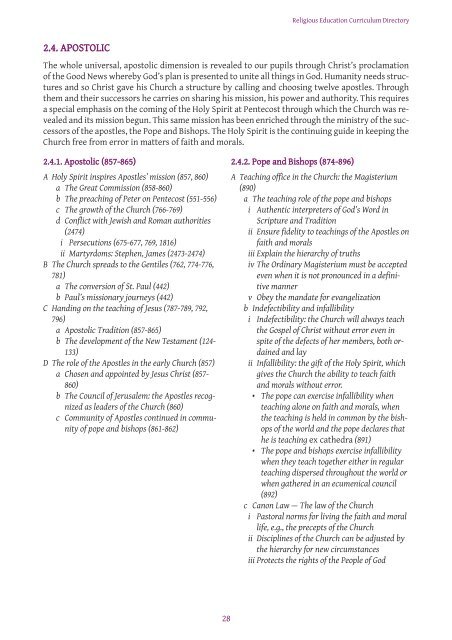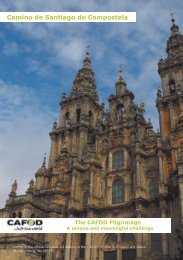Religious Education Curriculum Directory (3-19) - The Catholic ...
Religious Education Curriculum Directory (3-19) - The Catholic ...
Religious Education Curriculum Directory (3-19) - The Catholic ...
- No tags were found...
You also want an ePaper? Increase the reach of your titles
YUMPU automatically turns print PDFs into web optimized ePapers that Google loves.
<strong>Religious</strong> <strong>Education</strong> <strong>Curriculum</strong> <strong>Directory</strong>2.4. APOSTOLIC<strong>The</strong> whole universal, apostolic dimension is revealed to our pupils through Christ’s proclamationof the Good News whereby God’s plan is presented to unite all things in God. Humanity needs structuresand so Christ gave his Church a structure by calling and choosing twelve apostles. Throughthem and their successors he carries on sharing his mission, his power and authority. This requiresa special emphasis on the coming of the Holy Spirit at Pentecost through which the Church was revealedand its mission begun. This same mission has been enriched through the ministry of the successorsof the apostles, the Pope and Bishops. <strong>The</strong> Holy Spirit is the continuing guide in keeping theChurch free from error in matters of faith and morals.2.4.1. Apostolic (857-865)A Holy Spirit inspires Apostles’ mission (857, 860)a <strong>The</strong> Great Commission (858-860)b <strong>The</strong> preaching of Peter on Pentecost (551-556)c <strong>The</strong> growth of the Church (766-769)d Conflict with Jewish and Roman authorities(2474)i Persecutions (675-677, 769, 1816)ii Martyrdoms: Stephen, James (2473-2474)B <strong>The</strong> Church spreads to the Gentiles (762, 774-776,781)a <strong>The</strong> conversion of St. Paul (442)b Paul’s missionary journeys (442)C Handing on the teaching of Jesus (787-789, 792,796)a Apostolic Tradition (857-865)b <strong>The</strong> development of the New Testament (124-133)D <strong>The</strong> role of the Apostles in the early Church (857)a Chosen and appointed by Jesus Christ (857-860)b <strong>The</strong> Council of Jerusalem: the Apostles recog-nized as leaders of the Church (860)c Community of Apostles continued in commu-nity of pope and bishops (861-862)2.4.2. Pope and Bishops (874-896)A Teaching office in the Church: the Magisterium(890)a <strong>The</strong> teaching role of the pope and bishopsi Authentic interpreters of God’s Word inScripture and Traditionii Ensure fidelity to teachings of the Apostles onfaith and moralsiii Explain the hierarchy of truthsiv <strong>The</strong> Ordinary Magisterium must be acceptedeven when it is not pronounced in a definitivemannerv Obey the mandate for evangelizationb Indefectibility and infallibilityi Indefectibility: the Church will always teachthe Gospel of Christ without error even inspite of the defects of her members, both ordainedand layii Infallibility: the gift of the Holy Spirit, whichgives the Church the ability to teach faithand morals without error.• <strong>The</strong> pope can exercise infallibility whenteaching alone on faith and morals, whenthe teaching is held in common by the bishopsof the world and the pope declares thathe is teaching ex cathedra (891)• <strong>The</strong> pope and bishops exercise infallibilitywhen they teach together either in regularteaching dispersed throughout the world orwhen gathered in an ecumenical council(892)c Canon Law — <strong>The</strong> law of the Churchi Pastoral norms for living the faith and morallife, e.g., the precepts of the Churchii Disciplines of the Church can be adjusted bythe hierarchy for new circumstancesiii Protects the rights of the People of God28
















